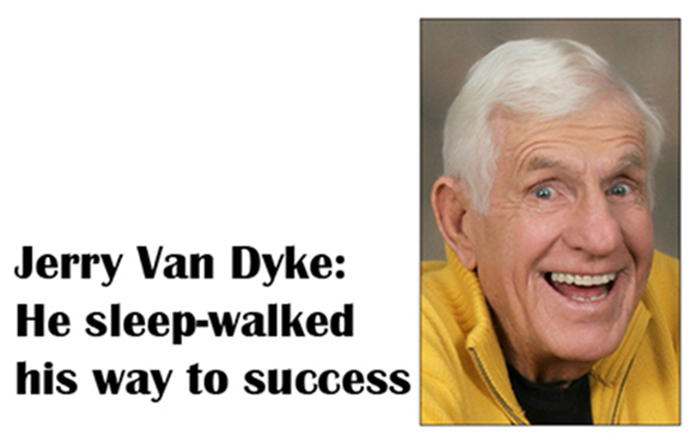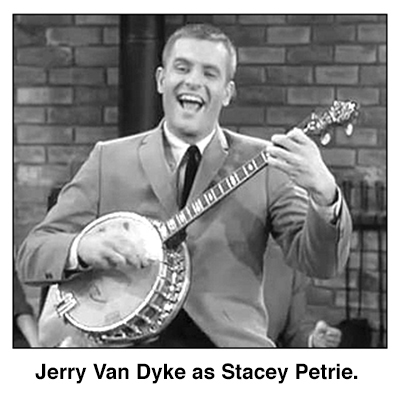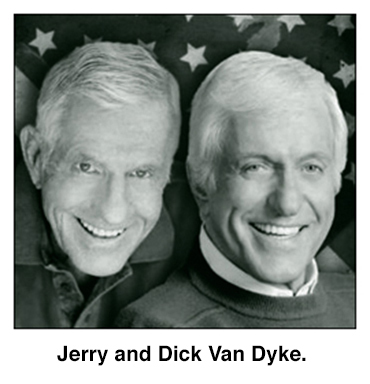| HOME |
 |
 |
|
My first interview with Jerry Van Dyke came in March 25, 1962. The phone call was set up by a Beverly Hills publicist to call attention to the young comedian's appearance on his brother's struggling television series. Yes, it was the first season of "The Dick Van Dyke Show" and it was not doing well in the ratings. Jerry Van Dyke was featured in a two-part episode, appropriately playing Stacey Petrie, younger brother of Rob Petrie. Stacey was a soldier about to be discharged. He wanted to go into show business, but he had an unusual problem — he was painfully shy. Well, he was when he was awake. But when he asleep he turned into a banjo-plunking, wild and crazy guy. His sleep-walking knew no bounds. Parts of the Stacey Petrie story mirrored Jerry Van Dyke's real life. He had been in the army, and while in uniform he performed twice on "The Ed Sullivan Show," which featured servicemen on Sullivan's annual Christmas programs. Van Dyke was discharged in 1957 and became a nightclub comedian. He was 23-year-old at the time. His act — part of it, anyway — resembled Stacey Petrie's sleep-walking antics. By the time he appeared on his brother's show, Jerry Van Dyke had made a name for himself on the comedy circuit. However, his performance as Stacey Petrie hastened his success. Our interview was conducted before the two-parter aired, but already Jerry Van Dyke was fielding other offers. “I’m going to make a pilot film for a new television series,” he said. “It will be called ‘Double Trouble,' and I’ll be a cub reporter for a small newspaper in Cloverdale, Tennessee which is across the river from Cloverdale, Virginia, and the series will be about the trouble the two towns have because of their names. It’s based on an actual situation in Bristol, Tennessee.” Van Dyke said he hopes the series clicks “because I don’t particularly like nightclub work. “Besides, I think I’m better suited for television than clubs. I’d rather do comedy acting. Too many successful nightclub comedians get stuck in a mold. Jack E. Leonard and Dick Shawn, for example, have a hard time doing well on television because they are too associated with their routines.” Jerry Van Dyke’s routine was faintly reminiscent of pre-television’s George Gobel. He entered strumming a banjo, then went into monologues he described as “an Andy Griffith kind of country humor.” Van Dyke managed to escape comparisons ... even with his brother. Dick Van Dyke, being five years older, got into show business before his brother. He was performing in Los Angeles in the early 1950s when his family paid a visit and caught one of his shows. Jerry Van Dyke confessed he temporarily “borrowed” his brother’s act when he went back home to Danville, Illinois. He said he clowned his way through the Army, performing in several service shows, and later had a local television show in Terre Haute, Indiana. After a year he left Indiana, hit the nightclub circuit, eventually was booked at the Tropicana Club in Las Vegas. A few weeks later he filmed his two part appearance on his brother’s show. The series, "Double Trouble," never materialized. Instead CBS put Jerry Van Dyke into the short-lived "Judy Garland Show." He also had parts in the movies "Palm Springs Weekend," "McLintock!" and "Love and Kisses," and guest roles on television in "Perry Mason," "The Cara Williams Show" and "The Andy Griffith Show." In 1965 he finally had his own series, and when he visited Cleveland to promote the show, we had our second interview, this time in person: |
|
|
|
 |
|
I found it interesting that Jerry Van Dyke cites Ann-Margret as an actress who became a star despite awful performances. His brother, Dick, never mentioned Ann-Margret by name, but I had to believe she was on his mind when he mentioned how disappointed he was in his first movie, "Bye Bye Birdie." He starred in both the Broadway and screen versions, and said of the latter: “They Hollywood-ized it and turned ‘Birdie’ from adult entertainment into a kids’ picture. They took out the satire and replaced it with slapstick.” They also put the spotlight pretty much on the teenager played by Ann-Margret, who looked about five years too old for the role. As for Jerry Van Dyke's career, well he managed to keep working, though he had bad luck with four series in a row — "My Mother the Car" (1965-66), which lasted one season and 30 episodes; "Accidental Family" (1967-68), with Lois Nettleton, which ended after 16 episodes; "Headmaster" (1970), which starred Andy Griffith and was canceled after 13 episodes, and "13 Queens Boulevard" (1979), with Eileen Brennan, which was gone after nine episodes. Finally, in 1989, Jerry Van Dyke struck gold in the Craig T. Nelson series, "Coach," which ran until 1997. In all the show presented 199 episodes. He's appeared since then in several television shows, most recently two episodes of ABC's "The Middle." In 2004 he joined his brother in a TV movie, "The Dick Van Dyke Show Revisited," and a few years ago they performed together on stage in Neil Simon's "The Sunshine Boys." On January 5, 2018, Jerry Van Dyke died. He was 86 years old. On December 13, 2018, Dick Van Dyke celebrated his 93rd birthday. |
|
 |
|
| HOME • STARSTRUCK • CONTACT |